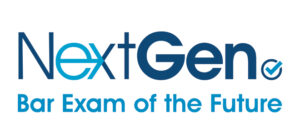This article originally appeared in The Bar Examiner print edition, Spring 2024 (Vol. 93, No. 1), pp. 68.By Andreas Oranje, PhD, MBA
With recent NextGen milestones reached, this quarterly update covers item development, the prototype exam, exam co-designing, and our road to the first NextGen exam administration in 2026.
Now that the NextGen pilot and field test are complete and we have the critical information required to start building exam forms, we are transitioning to at-scale item development. The bar exam’s item development process includes: external committees, largely consisting of law faculty, drafting and reviewing new items; editing and fairness reviews; and ample pre-testing. Several committees are transitioning from developing NCBE’s current exam products to doing so for NextGen. A few new committees have been created to develop newer item types and domains (e.g., item sets and business associations, respectively). Soon, the extension of the content scope outline regarding family law will be completed and a drafting committee formed to start developing standalone items in this doctrinal area, which will be first used on the July 2028 exam. Content development of the NextGen exam is in the best possible hands: those of nationally renowned experts and experienced item writers.
Prototype exam preparations are in full force, with the event taking place in October 2024. NCBE is partnering with dozens of bar administrators to conduct this first operational-like exam. This summer, recruitment of prototype exam participants from individuals taking the July 2024 bar exam will begin. Besides providing an opportunity for administrators and NCBE to gain additional experience with the NextGen bar exam design and procedures, the prototype exam serves another critical goal: determining the relationship of the new exam to the current one. That, in turn, will provide the key to determining the equivalent passing scores between the two exams. Prototype exam data will also be used to conduct an expert judgment study to further support the determination of passing scores from a predominantly content perspective. The prototype exam will support some of the most important implementation steps and policy decisions to come.
Although the NextGen bar exam’s general parameters have been set, including its overall design, delivery method, and timeline, we are still fine-tuning many processes, methods, and policies. We are working with several advisory committees, including ones focused on policy, grading, and administration/operations. All such committees include a key stakeholder contingent—bar administrators—who know best how exam administration works on the ground and what the implications of design decisions are. To the extent possible and practical, we are including stakeholders in a co-design approach to ensure that the NextGen bar exam launch will be successful. We remain extraordinarily grateful to all the administrators who have contributed their expertise and experience to this exam’s design and development.
After the prototype exam, our “road to 2026” will include additional field testing; integrating the registration software with our delivery vendors; refactoring our form assembly, analysis, and score reporting software and integrating that with the item banking, grading, and delivery platforms; and creating extensive instruction and training materials that cover everything from administrative procedures to working with the various platforms. A lot of work remains to be done, as evidenced above, but we are fully on track and excited to be working on an exam that is contemporary in every respect: content, methods, and technology.
 Andreas Oranje, PhD, MBA, is the Managing Director of Assessment Programs for the National Conference of Bar Examiners.
Andreas Oranje, PhD, MBA, is the Managing Director of Assessment Programs for the National Conference of Bar Examiners.

Contact us to request a pdf file of the original article as it appeared in the print edition.







